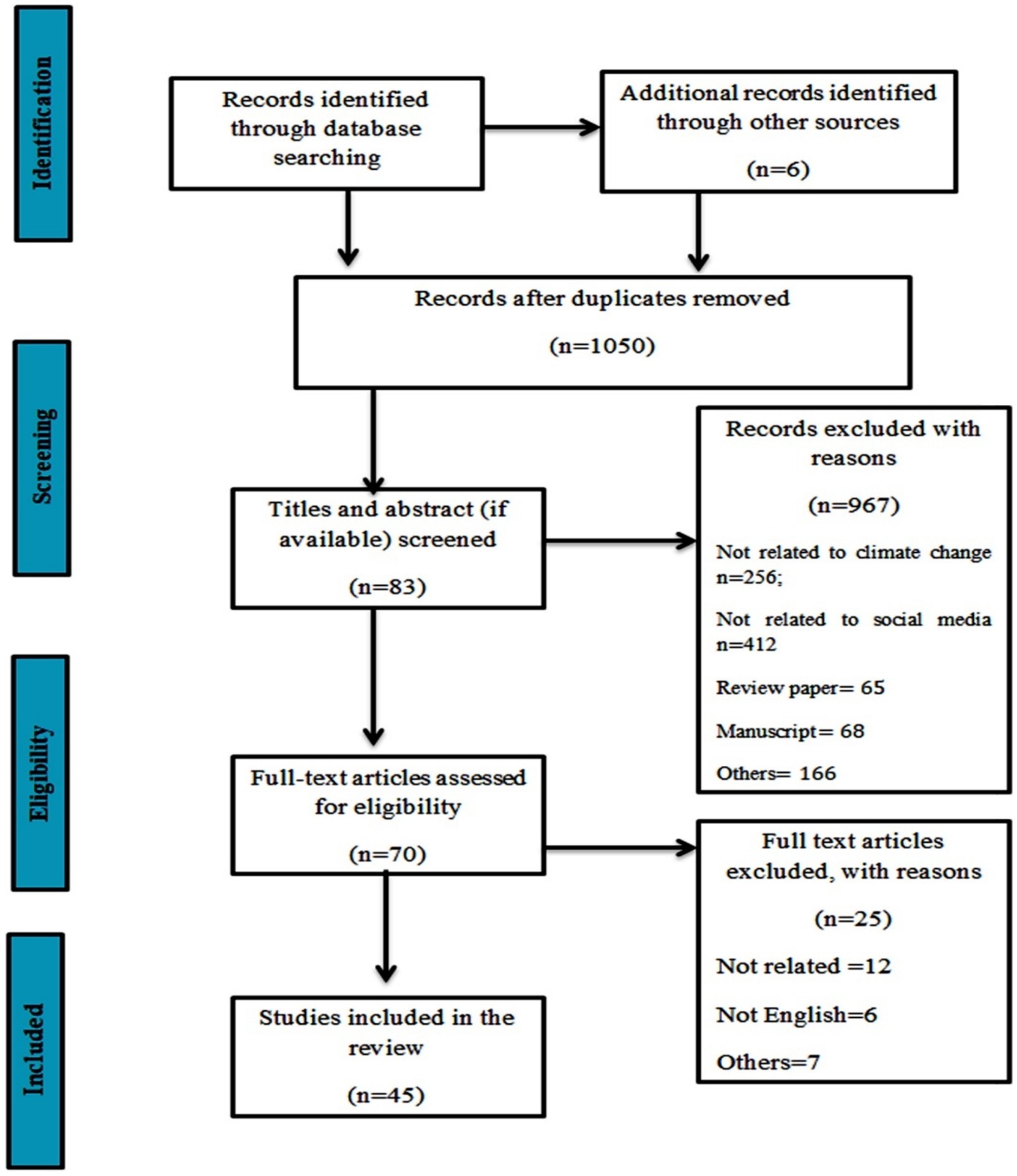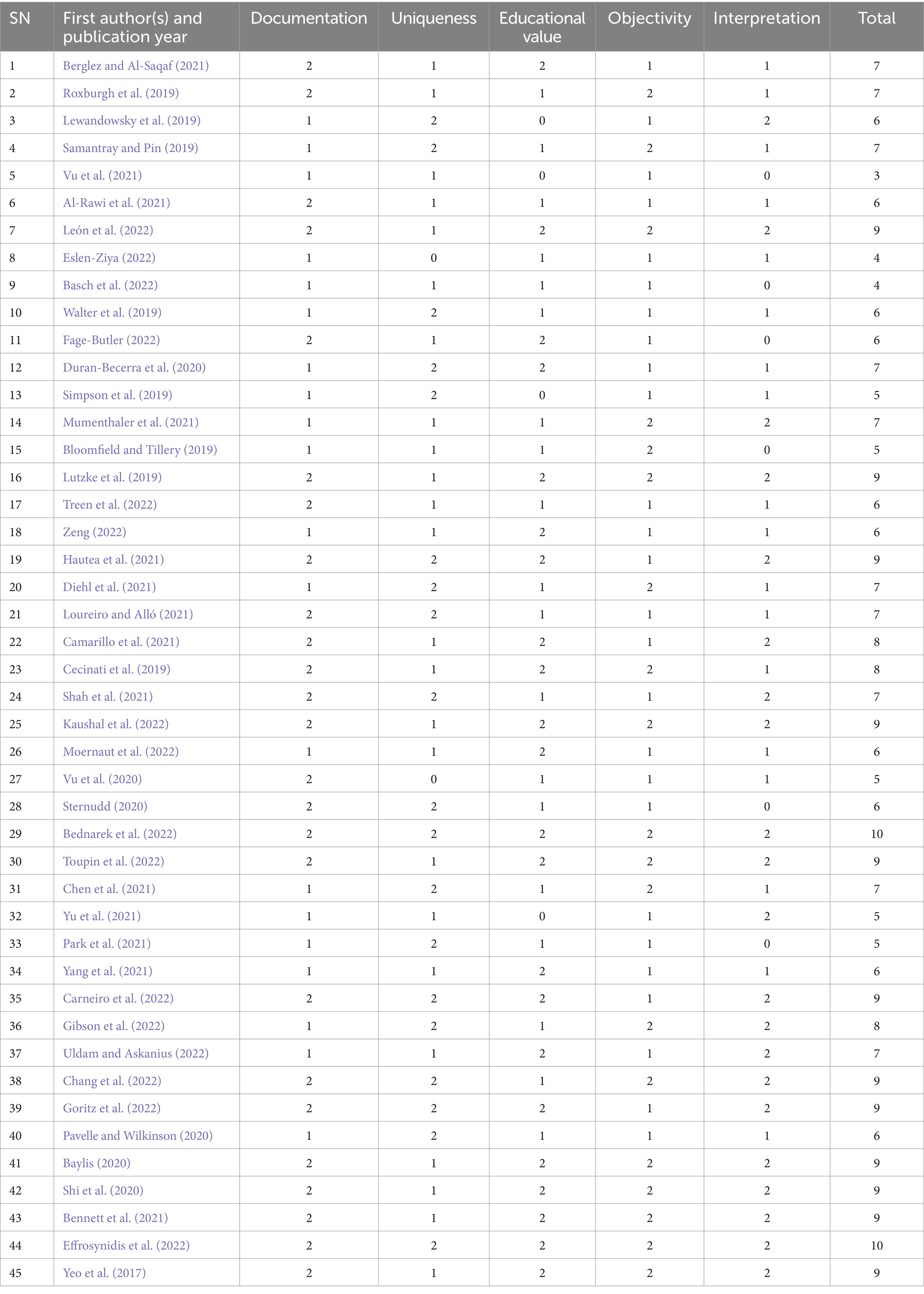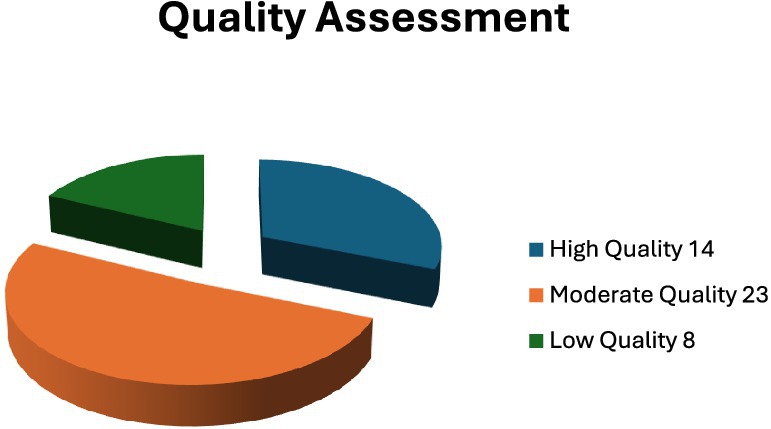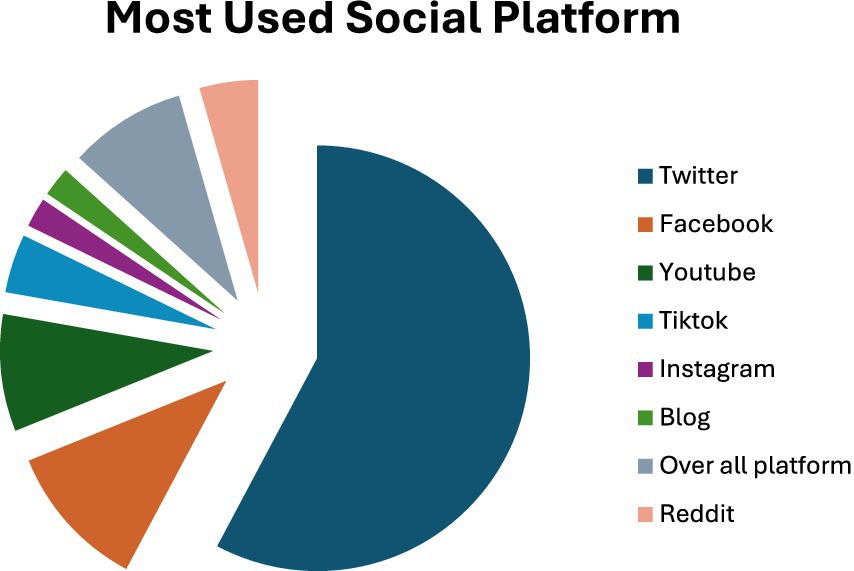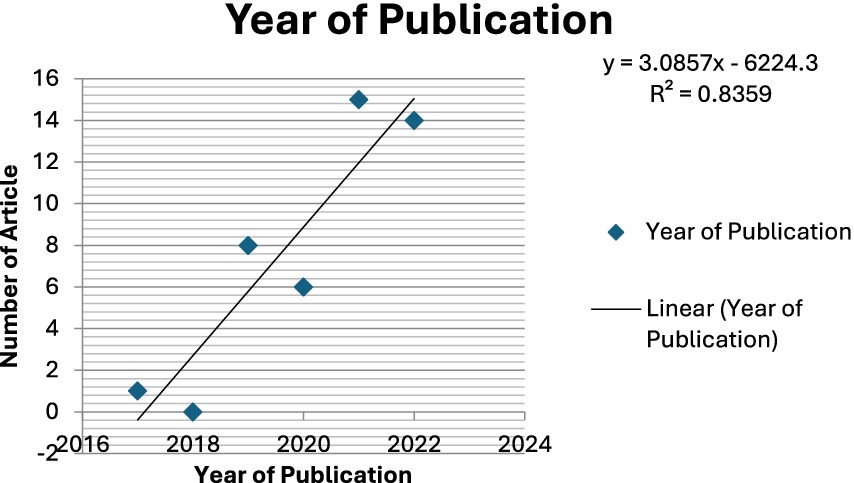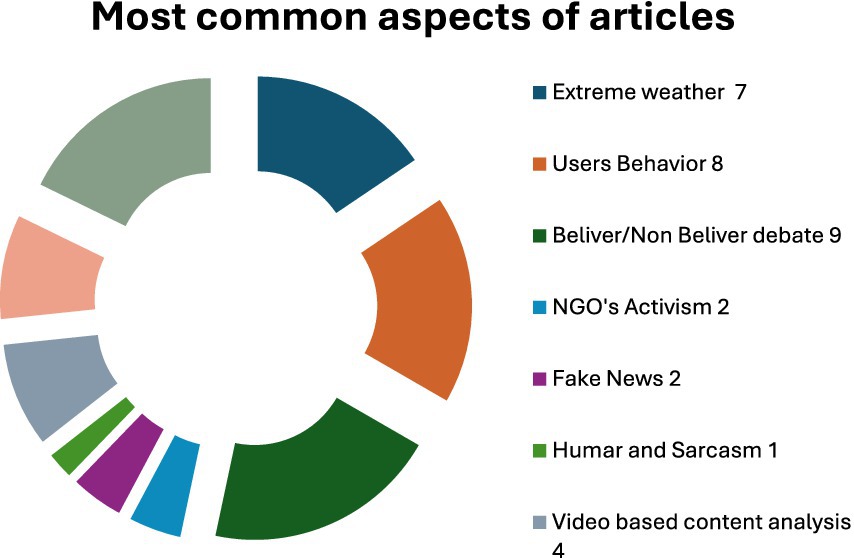- 1Department of Mass Communication and Journalism, Begum Rokeya University, Rangpur, Bangladesh
- 2Department of Geography and Environmental Studies, University of Chittagong, Chittagong, Bangladesh
- 3Faculty of Resilience, Rabdan Academy, Abu Dhabi, United Arab Emirates
- 4Department of Development Studies, Daffodil International University, Dhaka, Bangladesh
- 5Department of Industrial and Production Engineering, Bangladesh University of Engineering and Technology, Dhaka, Bangladesh
- 6Department of Geography, The University of Burdwan, Bardhaman, West Bengal, India
- 7Department of Civil and Environmental Engineering, College of Engineering, King Faisal University, Al-Ahsa, Saudi Arabia
- 8Department of Disaster Management, Begum Bekeya University, Rangpur, Bangladesh
Social media and climate change are some of the most controversial issues of the 21st century. Despite numerous studies, our understanding of current social media trends, popular hot topics, and future challenges related to climate change remains significantly limited. This research presents a systematic review of climate change and social media for the first time. Review the studies published between 2009 and 2022 in places like Google Scholar, Science Direct, Web-of-Science, Scopus, ResearchGate, and others. For this systematic review, we found 1,057 articles. Forty-five articles were the most relevant according to our goals and study design, which followed the PRISMA framework. The results of this review demonstrate that Twitter is the most popular platform. Every year, we identify rising trends in the number of publications. Past studies often focused on just one social media site, like Twitter (n = 26) or Facebook (n = 5). Although most studies focus on the United States, the study area is primarily “all over the world.” This study offers a theoretical framework by examining the relationship between social media platforms and the discourse surrounding climate change. It looked into how social media trends influence public perception, raise awareness, and spur action on climate change. In practical terms, the study focuses on important and trending topics like nonbelievers and climate change. The contribution consists of synthesizing the body of research, providing insights into the state of the digital world, and suggesting future lines of inquiry for the field of social media and climate change studies. We highlighted the studies’ quality assessment result of “moderate quality.” This systematic review provides information about how climate change is now portrayed on social media and lays the groundwork for further study in this area.
1 Introduction
One of the world’s biggest problems in the twenty-first century is climate change, a worldwide phenomenon (IPCC, 2018). Due to social media’s importance as a platform for information sharing, public participation, and activism, there is an increasing interest in understanding the link between climate change and social media (Brossard and Nisbet, 2007; Cook et al., 2013). People and organizations may coordinate campaigns to address climate change using social media platforms like Facebook, Twitter, and Instagram (Williams et al., 2015). Social media platforms are now crucial for examining public perceptions and attitudes towards climate change because they have grown to be a significant source of information and communication for people worldwide (Yang et al., 2021; Carneiro et al., 2022; Uldam and Askanius, 2022; Chang et al., 2022). Kirilenko and Stepchenkova (2014) and Leiserowitz et al. (2013) used social media to understand people’s motivations and views and better understand climate change attitudes. Social media can mobilize a community, disseminate information about the issue, and foster dialogue (Cann et al., 2021). Despite its rising importance, there needed to be more research on social media use about climate change (León et al., 2022; Berglez and Al-Saqaf, 2021; Walter et al., 2019; Mumenthaler et al., 2021). Therefore, this study must thoroughly review the literature on social media use and climate change.
The review delved into how people use social media to discuss and disseminate information about climate change, its potential for raising awareness and encouraging action, and the challenges and limitations associated with its use in this context (IPCC, 2018). The review focused on studies published between 2009 and 2022 to provide a comprehensive and current recognition of the present state of studies on this topic. The review would be based on a thorough search of academic databases and internet resources such as Google Scholar, Science Direct, Web of Science, Scopus, Research Gate, and PubMed. The search would include any English-language publications, papers, or book chapters that discuss using social media about climate change. The review employed predetermined inclusion and exclusion criteria to choose the studies for inclusion. Two independent researchers extracted the data, resolving discrepancies through discussion and consensus.
This systematic review aimed to examine the existing literature on the use of social media in the context of climate change, focusing on how social media is used to discuss, disseminate information, and mobilize action on climate change. The review identifies the key themes and trends in the literature and provides insights into social media’s potential as a tool for combating climate change. The systematic review will follow the Preferred Reporting Items for Systematic Reviews and Meta-Analyses (PRISMA) guidelines (Liao et al., 2015; Su and Zhang, 2014). The study will be transparent and thorough, including the search methods, inclusion and exclusion standards, and data extraction forms for simple replication and results verification. The review will also adhere to a rigid and organized procedure to guarantee accurate and legitimate outcomes. This systematic review was conducted to compile a few noteworthy research papers that will be helpful to future academics doing their study in this area, keeping in mind all the difficulties linked to social media and climate change that have been presented.
This review is going to answer the following research questions:
• What are the main research gaps on social media and climate change in the literature?
• What are the present trends and hot topics between social media and climate change?
• What are the suggestions for future research?
The following are the main goals of this review:
i. To identify the key themes and trends in the literature on using social media in the context of climate change.
ii. To understand how social media is used to discuss, disseminate information, and mobilize action on climate change.
iii. To illustrate the future research suggestions of social media and climate change.
So far, this is the first systematic evaluation to examine each study and evaluate how social media is utilized to combat climate change. The paper also touches on several current hot topics in the area, such as how social media may promote climate literacy, how it can be used to mobilize climate action, and how social media may increase social and political polarization in the context of climate change. The authors also discuss the challenges that future research on climate change and social media may face, such as the need for more multidisciplinary studies, the moral ramifications of using data from social media, and better communication methods with various audiences.
2 Materials and methods
The Preferred Reporting Items for Systematic Reviews and Meta-Analyses (PRISMA) guidelines were followed in designing and reporting the present study (Page et al., 2021). The guidelines and key points followed in this study are presented in Figure 1.
2.1 Search strategy
Five databases have been searched for scientific work, including Web of Science, Science Direct Sci-Lit, Scopus, Google Scholar, and PubMed. Several keywords were utilized to explore climate change in a social media-related article, such as “climate change,” “global warming,” “temperature hike,” and “social media,” and their variations combined with the Boolean operators’ “AND” and “OR.” A search in Google Scholar was conducted using the preferred year of publication from 2007 until 2022 to acquire the best current research for this systematic review. Overall acquired studies and their selection process were followed according to PRISMA guidelines.
2.2 Inclusion and exclusion criteria
Studies were incorporated regardless of language, time, or study restrictions. The following criteria were employed to include studies: (i) original research; (ii) published work; (iii) experimental and scientific research about climate change on social media, including observational work, time series studies, and research that has been carried out using statistical methods, valid modeling, and reliable datasets; (iv) research work that contains accurate sources and variations in data in the selected region of study; (v) Results were described using appropriate illustrations and quantitative values, such as the present concentration. Lastly, “snowball” approach is also used as an inclusion criteria to identify more possibly relevant studies (Greenhalgh and Peacock, 2005). Snowballing is a strategic technique for identifying more articles by systematically reviewing a work’s reference or citation list (Abbate et al., 2023). Following the execution of this inclusion criteria, we have included three publications on the topic in the text database. This final inclusion criteria confirmed that any pertinent studies were included in the final sample of publications. Hence, the final samples consisted of 45 papers. Global warming and the trend of a temperature hike or social platform’s database over the study area. The exclusion criteria for this study were as follows: (i) not authentic research or duplicate work, conference papers, journal pre-proofs, manuscripts, or reviews; and not related climate change on social media; (ii) lack of quantitative data regarding social media platform; (iii) studies were conducted on global focus also excluded for systematic review.
2.2.1 Type of outcome
Studies that contained results and scenarios regarding climate change, global warming, and temperature hikes on social media were included in this review.
2.2.2 Study selection
The initial search studies were all exported in CSV format. The Scopus and Web of Science databases were accessed using keywords. Free access is provided to them, Sci-Lit, and Google Scholar databases. Mendeley v1.19.8 was used to delete duplicate articles, along with manual removal. After removing duplicates, the articles were screened for title, abstract, and full text.
2.2.3 Title/abstract screening
The research selection criteria were applied to the titles and abstracts during this initial screening. We conducted a full-text review to clarify conclusions in cases of conflict or indecision. After removing journal preprints, preprints from government reports, and book chapters, we included articles published in peer-reviewed journals.
2.3 Data eligibility
We primarily identified 1,057 articles for this systematic review. We selected papers in four stages: identification, screening, eligibility, and inclusion. Using the PRISMA framework in this study, we identified 1,057 articles in the identification stage (Figure 1). We then removed six duplicate articles by cross-checking each one. After removing six duplicates, we got 1,050 articles in the screening phase. We excluded 967 of those 1,050 articles for various reasons, including their irrelevance to the topic, review papers, manuscripts, journal pre-proofs, and their global or regional focus. Based on the study’s purpose, we selected 83 articles. However, we could not access the full text of 13 articles. Seventy articles got full-text assessments for eligibility. After excluding 25 articles from them, we got our final results, which meant including articles. Based on our objectives and study design, 45 articles were the most relevant. For this study, we systematically reviewed 45 articles.
2.4 Data extraction
A data extraction file was generated to collect information from the database. Data extraction included: (i) the first author and publication year, (ii) the sampling procedure, (iii) the social platform, (iv) the objectives of the study, and (v) the methodology of the study. The first group of writers separately screened the title and abstract, read the whole article, incorporated any pertinent publications, and extracted data from the entire article. Using the Mendeley program, duplicate papers were weeded out, and titles and abstracts were screened.
2.5 Quality assessment
Pierson’s technique evaluated the quality of the included studies’ quality. Documentation, uniqueness, instructional value, objectivity, and interpretation are the five components used to evaluate the caliber and validity of case reports and case series studies. Each component has a maximum of two points (the score ranges from 0 to 2). Hence, the overall score might vary from 0 to 10, with 9–10 denoting great quality, 6–8 denoting intermediate quality, and five denoting bad quality (Pierson, 2009).
3 Results
3.1 Description of the current trends of included studies
Based on the criterion for inclusion, the review comprised 45 studies. The studies were all “Climate Change on Social Media” studies, where information from the related field was gathered in the past. Most research used a mix of methods and social media databases to get their data (Table 1). The chosen studies were based on well-known social media sites like Twitter, Facebook, YouTube, Reddit, Instagram, TikTok, and blogs. Among the 45 papers that were chosen, 26 studies focused on Twitter (Berglez and Al-Saqaf, 2021; Roxburgh et al., 2019; Samantray and Pin, 2019; Al-Rawi et al., 2021; León et al., 2022; Eslen-Ziya, 2022; Walter et al., 2019; Mumenthaler et al., 2021; Li et al., 2022; Diehl et al., 2021; Loureiro and Alló, 2021; Cecinati et al., 2019; Moernaut et al., 2022; Vu et al., 2020; Bednarek et al., 2022; Toupin et al., 2022; Yu et al., 2021; Yu et al., 2021; Uldam and Askanius, 2022; Goritz et al., 2022; Pavelle and Wilkinson, 2020; Patrick et al., 2020; Shi et al., 2020; Bennett et al., 2021; Effrosynidis et al., 2022; Yeo et al., 2017). Five studies on Facebook (Vu et al., 2021; Bloomfield and Tillery, 2019; Lutzke et al., 2019; Li et al., 2022; Pavelle and Wilkinson, 2020). Four studies on YouTube (Duran-Becerra et al., 2020; Sternudd, 2020; Chang et al., 2022), two studies on Tiktok (Basch et al., 2022; Hautea et al., 2021), 1 study on Instagram (Pavelle and Wilkinson, 2020), 1 study on blogs, 4 studies on all social media platforms (Fage-Butler, 2022; Simpson et al., 2019; Loureiro and Alló, 2021; Lu et al., 2021), and 2 studies on Reddit (Treen et al., 2022; Kaushal et al., 2022). Twitter was the foundation for significant studies. All of the research concentrated on various social media-related aspects of climate change, including extreme weather (Berglez and Al-Saqaf, 2021; Roxburgh et al., 2019; Mumenthaler et al., 2021; Cecinati et al., 2019; Goritz et al., 2022; Patrick et al., 2020; Effrosynidis et al., 2022; Yeo et al., 2017); user behavior (Lewandowsky et al., 2019; León et al., 2022; Walter et al., 2019; Pavelle and Wilkinson, 2020; Simpson et al., 2019; Li et al., 2022; Lu and Hampton, 2016; Toupin et al., 2022; Shi et al., 2020), The believer/non-believer debate (Samantray and Pin, 2019; Bloomfield and Tillery, 2019; Treen et al., 2022; Moernaut et al., 2022; Bednarek et al., 2022; Bennett et al., 2021), NGO activism (Vu et al., 2021; Brunnschweiler and Baland, 2009; Eslen-Ziya, 2022) Fake news (Al-Rawi et al., 2021; Lutzke et al., 2019), Humor and sarcasm (Pavelle and Wilkinson, 2020), Video-based content analysis of climate (Basch et al., 2022; Duran-Becerra et al., 2020; Hautea et al., 2021; Sternudd, 2020; Fage-Butler, 2022; Gaytan et al., 2021; Lindell and Ibrahim, 2021), Corona and Climate change (Diehl et al., 2021; Camarillo et al., 2021; Gibson et al., 2022) and politics/other topics (Yu et al., 2021; Yu et al., 2021; Chang et al., 2022; Yang et al., 2021; Carneiro et al., 2022; Uldam and Askanius, 2022). All the study subjects were from all over the world which was primarily from the European and American regions, including Sweden, the United Kingdom, the Netherlands, Mexico, the United States, San Francisco, countries in the Middle East, Turkey, and a few Asian nations, including China, Taiwan, and India. Most of the studies received a moderated quality rating (Table 2).
3.2 Quality assessment results
On the quality assessment scale, 14 studies were high quality (scores of 9–10), 24 studies were moderate quality (scores of 6–8), and 8 studies were low quality (scores of ≤5). So, the quality assessment result of forty-five selected articles is moderate (Figure 2; Table 2).
3.3 Study outcomes and major limitations
The 45 articles chosen for inclusion found that the symmetrical impacts of blog comments and the apparent consensus followed the same pattern (Table 3). The evolution of homophily impacts long-term polarization evolution and, over time, adversely impacts long-term polarization evolution. Most tweets are about the United States. Twitter saw more anti-liberal or anti-democratic internet community activity than the anti-conservative or anti-Republican group. Supporters of environmental change highlighted climate change developments in Turkey and around the world using scientific justifications. A climate change register will encourage a culture that is more concerned with the adverse consequences of climate change and foster more powerful ideas for resilience, adaptation, and mitigation. Research has also drawn attention to the fact that sentiment analysis reveals that overall attitudes concerning climate change are improving. Knowledge dissemination regarding climate change and Twitter activity depends on socioeconomic factors like income, education, and other risk-related factors. By regularly addressing multiple subtopics at once, climate change debates were condensed rather than made more general. This exhibited a more scientific perspective. Climate change sparked more political responses, revealing a vital link to the phenomenon. The relatively small sample size, cross-sectional design, language, and difficulty constructing cross-cultural psychological variables were other limitations identified in certain studies. The algorithm developed searches for the presence of all words in the title of the study output and a string of the distributed URL, among other things, because it is impossible to search directly for hyperlinks in these engines.
3.4 Trendy social platform
Among the 45 research studies that were chosen, 26 studies focused on Twitter, five studies on Facebook, four studies on YouTube, two studies on TikTok, one study on Instagram, one analysis on blogs, four studies on all social media platforms, and two studies on Reddit (Figure 3).
3.5 Years of the most publication
Among the 45 selected articles, in 2017, one article got published; in 2018, no article got published; in 2019, eight articles got published; and in 2020, six. Researchers had published fifteen articles in 2021 and fourteen in 2022. The results show that there is a rising trend in the number of publications (R2 = 0.84, p < 0.05) (Figure 4).
3.6 Hot topics of articles
We present 45 papers related to climate change on social media from a multidisciplinary perspective in our systematic review (Figure 5). Among them, some common aspects have been categorized based on “extreme weather events,” “user behavior,” ““believer/non-believer debates,”” “NGO’s activism,” “c” “climate-related fake news analysis,” “humor and racism,” “vi “video-based content lysis,” “co “covid and mate,” and last but not least, “politics and others.” Here we saw seven articles based on “extreme weather events,” eight articles based on “user behavior,” n nine articles based on “believer/non-believer debate,” t two articles based on “NGO’s civism,” t two articles based on “climate-related fake news analysis,” 1 1 article based on “humor and sarcasm,” four articles based on “video-based content analysis, four articles based on “content and image,” and 8 articles based on “politics and others.”
3.7 Spatial distribution of the number of publications
We selected 45 papers published between 2009 and 2022 that evaluated climate change on social media (Table 1). Yeo et al. (2017) published the first of these works, which were based on the Twitter dataset (Figure 6A). Starting in 2019, there was a significant increase in the number of papers published per year (Figure 6B). The majority of climate change and social media research papers (n = 17) focused on the global context, with the USA (n = 10), China (n = 2), Sweden, Turkey, San Francisco, India, Australia, Taiwan, Mexico, the United Kingdom, Denmark, and Finland (n = 1) following closely behind. However, some articles (n = 6) did not mention any specific region. Our search did not retrieve any published papers for the remaining Latin American countries, Russia or Canada (Figure 6C). The country with the most significant number of studies is the USA (Figure 6A). 38% of the studies covered the world, and 22% covered the United States. China covered 5%, and the other countries marked on the map covered 2% each.
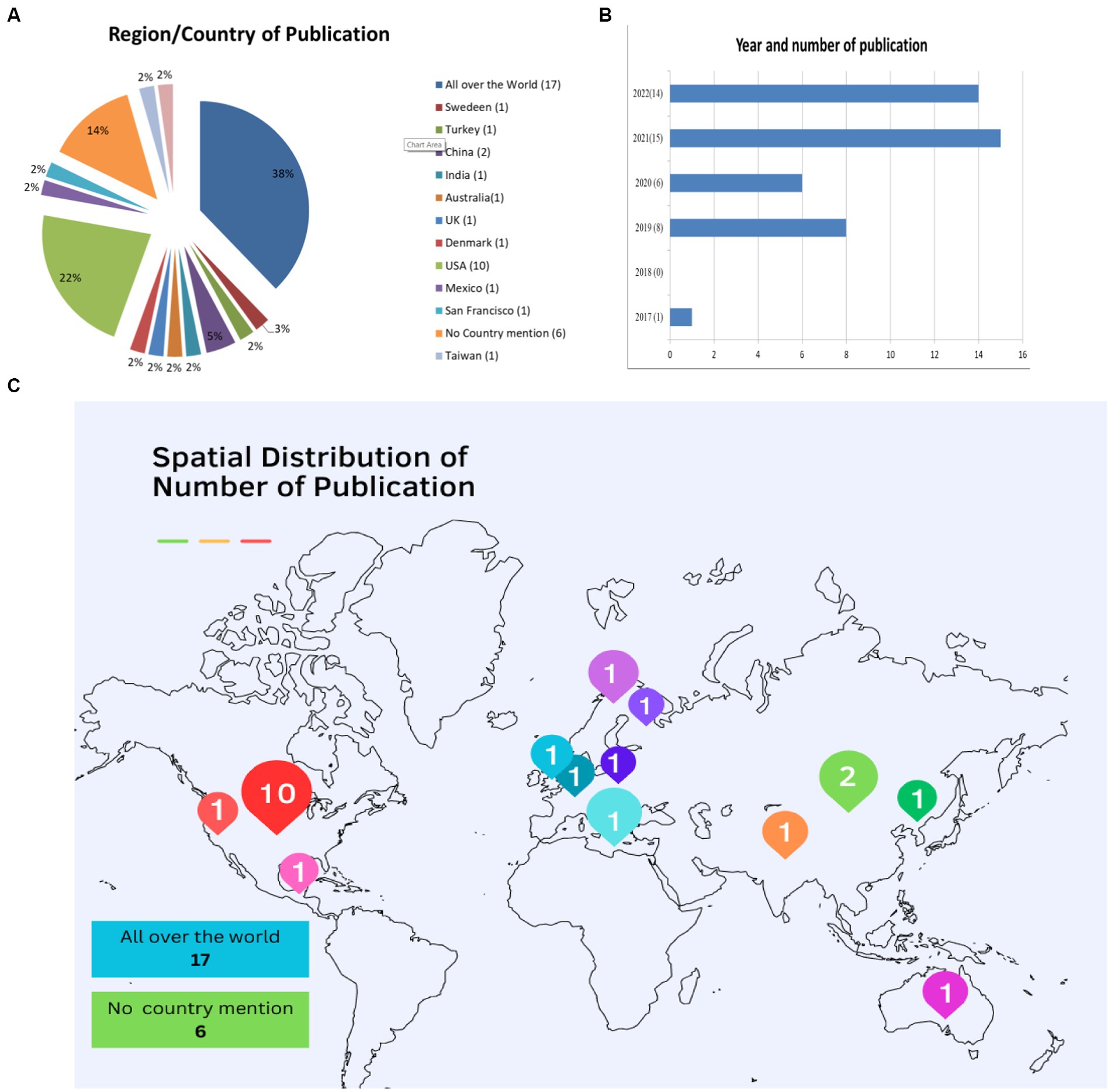
Figure 6. (A) Country – wise publication trend; (B) Year and number of publications shown in this review; and (C) Spatial distribution of the number of publication trends worldwide.
3.8 Topic modeling analysis
For topic modeling, this research used a method known as Latent Dirichlet Allocation, an unsupervised clustering method, to identify the crucial subjects in the corpus of Twitter data (LDA). People widely employ Latent Dirichlet Allocation (LDA) to find subjects on Twitter (Zhao et al., 2011). The LDA is a probabilistic topic model based on Bayesian latent variables. It conceptualizes documents as a collection of subjects, each represented by a set of words (Blei et al., 2003). An LDA model learns the topic representation of each document and the words related to each subject from a corpus of documents. After training and receiving a copy of the document, we provided a topic probability distribution to the model, identifying the pertinent issue(s) in the document. They conducted their investigation using Gensim, a well-known Natural Language Processing (NLP) Python package, and its Machine Learning for Language Toolkit (MALLET) implementation (McCallum, 2002). The ideal number of subjects for topic modeling depends on user input (Figure 7). In a successful model, the subjects are usually prominent. A formal method is necessary to evaluate the model holistically, allowing for assessing various aspects of its quality. Coherence is a well-liked statistic that honors similarity within a subject and contrast between topics (Ro der 2015). In an effective paradigm, the ideas are clear and understandable. Even though a variety of metrics can evaluate various aspects of a model’s quality, a formal method for assessing the model’s overall quality must exist. Coherence, a standard metric that promotes similarity within a subject and contrasts across topics, is one of the most used metrics (Bennett et al., 2021).
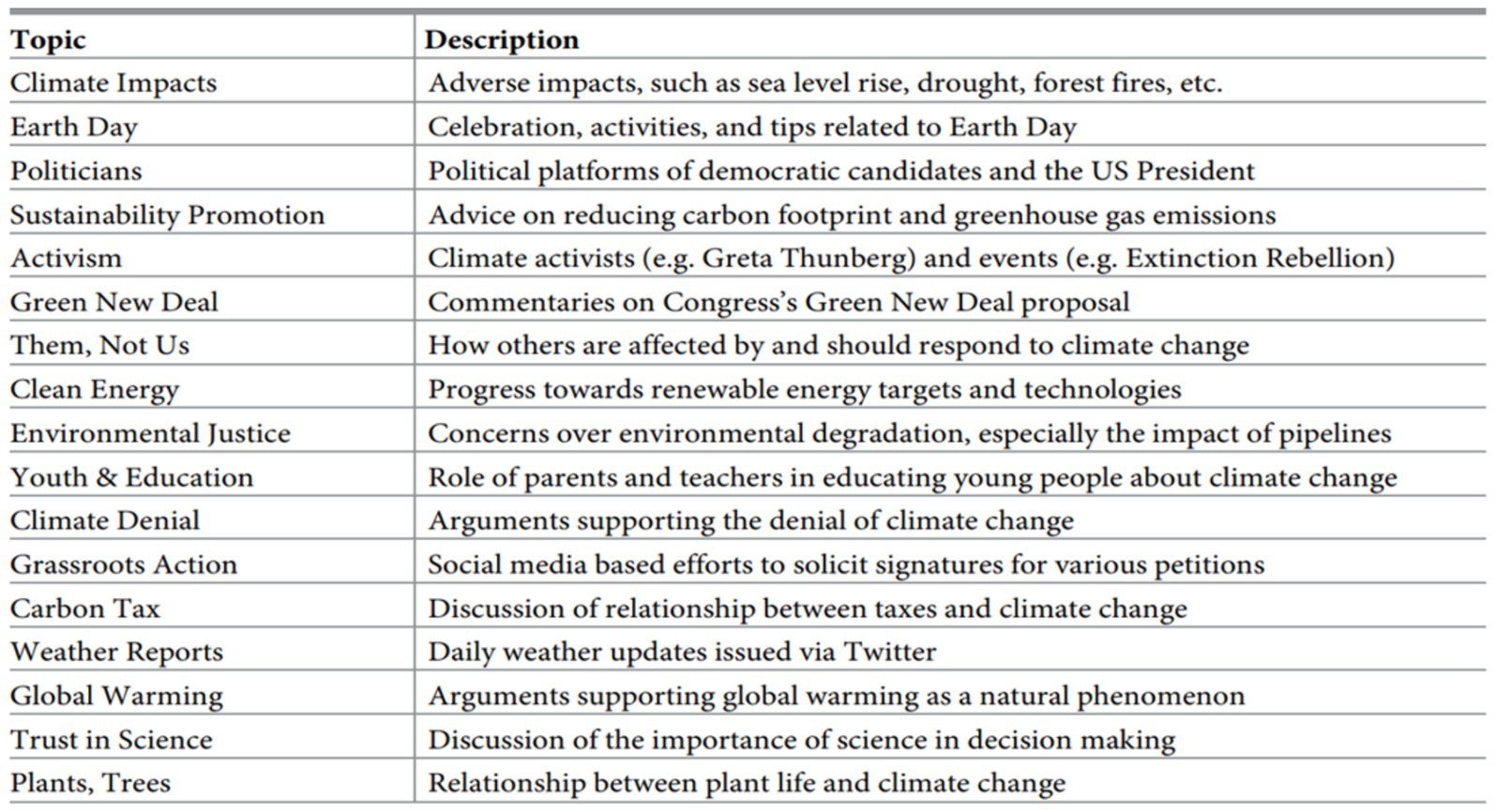
Figure 7. Categories from LDA topic analysis and a brief summary of their content Adopted from Bennett et al. (2021).
4 Discussions
A systematic literature review on the topic stated that social media is an essential source of information for many people and can significantly affect how the general public thinks and feels about the issue. The results show that social media can be an excellent way to communicate and get involved in environmental issues. They also emphasize the importance of understanding the nuanced connections between social media use, participation in, and response to climate change. The systematic research observed a link between social media use and increased awareness about climate change. However, the presentation of the topic on social media significantly influences the general public’s views and feelings about the problem. The review also highlights the need for the literature to focus more on how algorithmic curation influences the dissemination of climate change information on social media.
The systematic review’s conclusions align with earlier research where the value of social media as a source of knowledge and a tool for involvement and communication about the environment (Perez et al., 2023). This review on the other hand, offers a more thorough understanding of the connection between social media and climate change by combining the results of various studies and highlighting the need for additional studies in crucial areas, such as the effect of algorithmic curation on the dissemination of climate change information.
The review has apparent implications for environmental participation and communication initiatives. It is crucial to comprehend the complex relationship between social media use and public participation and action since social media has the potential to be an essential tool for talking about climate change and involving the public in the issue. The results underscore the necessity for further research in this field and the importance of algorithmic curation in determining the dissemination of climate change information. For example, the social media site “Twitter” served as the foundation for many of the 45 selected studies. Although “Facebook” is a trendy platform, five studies used it as a base. We have examined various facets of Twitter users’ participation in climate-related issues. The analysis of YouTube video content was particularly noteworthy, given the prevalence of video consumption among young individuals. Studies on climate change, extreme weather, and catastrophic events have increased Twitter engagement. It has been shown that the spatial distribution of the extreme event tweets differs significantly from the off-topic tweets; flooding was by far the most tweeted topic regarding climate change, illustrative of a substantial spike in activity triggered by extreme events. The public recognizes severe temperature anomalies and attributes them to climate change; society rejects the existence of climate change even when extreme events happen; and Twitter users are skeptic of the idea of climate change.
Diehl et al. (2021) reported that people who get their news from social media are less skeptical about climate change. However, the individual-level social context (conservative political ideology and low trust in science) and the macro-level social context (high gross domestic product and individualism) moderate the effect of reducing social media’s potential to inform the public about climate change. This study contributes to the ongoing discussions about the possibility of emerging media to address scientific issues, particularly in developing countries.
Users’ pro-environmental activities are directly impacted by their exposure to climate change-related material on SNSs (α = 0.299, p < 0.01), which is similar to the earlier research by Lu and Hampton (2016). The association between exposure to information about climate change on SNSs and pro-environmental activities is also mediated by fear of being a victim of climate change (α = 0.149, SE = 0.029, p < 0.01). Moreover, the association between exposure to climate change information on SNSs and pro-environmental behaviors (α = 0.090, p < 0.01) and fear of climate change victimization (α = 0.090, p < 0.05) is moderated by attention deficit. Similarly, decision-making self-efficacy moderates the link between pro-environmental behaviors and fear of victimization from climate change (α = 0.267, p < 0.01).
Some of the main aspects of the studies include discussing extreme weather (the extreme-event factor), connecting extreme weather to climate change through traditional media or other intermediaries (the media-driven science communication factor), and examining the actions of individual users (the digital-action factor). A nonlinear hockey stick relationship between the two variables correlates a rise in weekly temperature volatility of 1°C with an 82% increase in tweets on climate change when volatility exceeds 3.5°C. This volatility impact started to appear in 2016, indicating a recent shift in how people conceptualize climate change. This study offers empirical proof that the general people may no longer see climate change as only an increase in temperature but rather as a disturbance of the climate system (Berglez and Al-Saqaf, 2021; Roxburgh et al., 2019; Mumenthaler et al., 2021; Cecinati et al., 2019; Goritz et al., 2022; Patrick et al., 2020; Effrosynidis et al., 2022; Yeo et al., 2017).
Users’ actions reflected readers’ support for the post; thus, anytime readers left supportive comments, participants backed the post’s argument more, regardless of its substance. The apparent consensus among readers exhibited the same tendency. The degree to which comments revealed that other readers agreed with the theory indirectly influenced participants’ opinions. Reports of relative indirect effects are sporadic in the absence of complete effects (Lewandowsky et al., 2019; León et al., 2022; Walter et al., 2019; Fage-Butler, 2022; An et al., 2014; Li et al., 2022; Lu and Hampton, 2016; Toupin et al., 2022; Shi et al., 2020).
The believer/non-believer debate over global warming deniers are more prevalent in the American Region, South Africa, Japan, and Eastern China. In contrast, they are less prevalent in Europe, India, and Central Africa. People associate warm temperatures more strongly with man-made climate change than cold temperatures. The same regions with more climate change deniers tweet aggressively and use the term “global warming” more frequently than believers. People tweet most positively when the deviation is between 1.1°C and + 2.4°C, and there is a 90% correlation between sentiment and stance and a − 94% correlation between sentiment and aggressiveness. However, there are no clear patterns that link sentiment and stance to disaster events based on the number of affected or total deaths (Samantray and Pin, 2019; Bloomfield and Tillery, 2019; Treen et al., 2022; Moernaut et al., 2022; Bednarek et al., 2022; Bennett et al., 2021). The Organizations in the sample mostly talked about climate change. Impact on the climate was the second. Their communications focused less on effectiveness. Among those in the sample of this study, NGOs from developed countries tended to discuss actions more than those from developing countries (Vu et al., 2020).
In the case of fake news, it is noted that these three dependent variables showed robust correlations. The higher correlations between liking and sharing also make sense, given that both are forms of online expression and, in most cases, signify approval of or praise for content. These relationships make sense, given that trusting social media content would be positively associated with liking and sharing it. The emergence of homophily impacts long-term polarization evolution over time. Information about climate change with a higher credibility rating among the numerous sources they encounter is more likely to persuade people. As a result, some academics investigate a model of belief polarization in social networks that takes both homophily in communication and trustworthiness in information dissemination into consideration. They discover that homophily in communication cannot promote polarization unless the information spreading false ideas has a bare minimum of credibility. Thus, they conclude from the empirical findings that anti-climate change tweets are largely unreliable (Al-Rawi et al., 2021; Lutzke et al., 2019) and full of humor and sarcasm (Hande, 2022).
Video-based content analysis shows that about four out of ten comments were rude in some way. Moreover, ageism, sexism, and ableism represented somewhat more than one-third, one-quarter, and 40 % of the rude remarks, respectively. The study indicates that rude remarks about Thunberg on YouTube were not deliberate, completely disregarded her views on climate change, and concentrated on her youth, gender, and Asperger’s disease (Basch et al., 2022; Duran-Becerra et al., 2020; Hautea et al., 2021; Sternudd, 2020; Pavelle and Wilkinson, 2020).
COVID-19 and climate change regarding Twitter activity must consider socio-economic factors, including income, education, and other risk-related factors. According to some research, the COVID-19 epidemic has also significantly reduced the volume of global communications published about climate change, delaying the discussion of the issue, particularly in some susceptible nations. The current pandemic has hindered the short-term planning of climate policy in countries that require urgent climate action, despite the climate emergency (Diehl et al., 2021; Na’puti, 2022; Gibson et al., 2022).
Politics or other topics highlight that. According to the Paris Agreement, the climate science community has been thriving in influencing discussions about climate change’s causes and effects. At the same time, the public administration has only been successful in influencing talks about its effects. Our analysis reveals a glaring gap in the administration’s public outreach, paradoxically placing less emphasis on the causes of climate change. While they work to bridge the gap between the general public and academics, politicians and climate activists may use this knowledge to their advantage when making decisions. Under the universalist-communitarian component of European politics that emerged after the rise of right-wing populism, climate politics is vulnerable to party sorting and issue alignment, even if it is less contentious than the other themes. Significantly, immigration and climate politics have historically coincided, and historical trends suggest that this tendency will undoubtedly continue. These were primarily centre-left candidates who advocated using technical advancements and green growth to drive climate action. However, civil society actors urged structural reform and solidarity-based climate action. They talk about how these depictions of the climate problem affect climate imagination and, ultimately, action potential (Chen et al., 2021; Yu et al., 2021; Lee and Lee, 2019; Carneiro et al., 2022; Uldam and Askanius, 2022; Chang et al., 2022).
4.1 Tweet ratio
The data spans 13 years, from June 6, 2006, to October 1, 2019, and includes 15,789,411 tweets. One-third of them (5,307,538) are known to be geolocated. Figure 8 depicts the tweets’ geographical distribution. The original locations of the tweets are biased because of the English-language keywords and hashtags used to generate the dataset. Most tweets originate from North America, Canada, the United Kingdom, Australia, and New Zealand, with a significant number also originating from Europe. In this region, English is a widely used second language. There are also more English tweets from countries with large populations, such as India, Japan, the Philippines, Indonesia, and Malaysia. China has prohibited Twitter; thus, there are hardly any tweets there. The Gulf of Guinea, Uganda, Kenya, South Africa, Central America, and the Brazilian East Coast are more places with tweet activity.
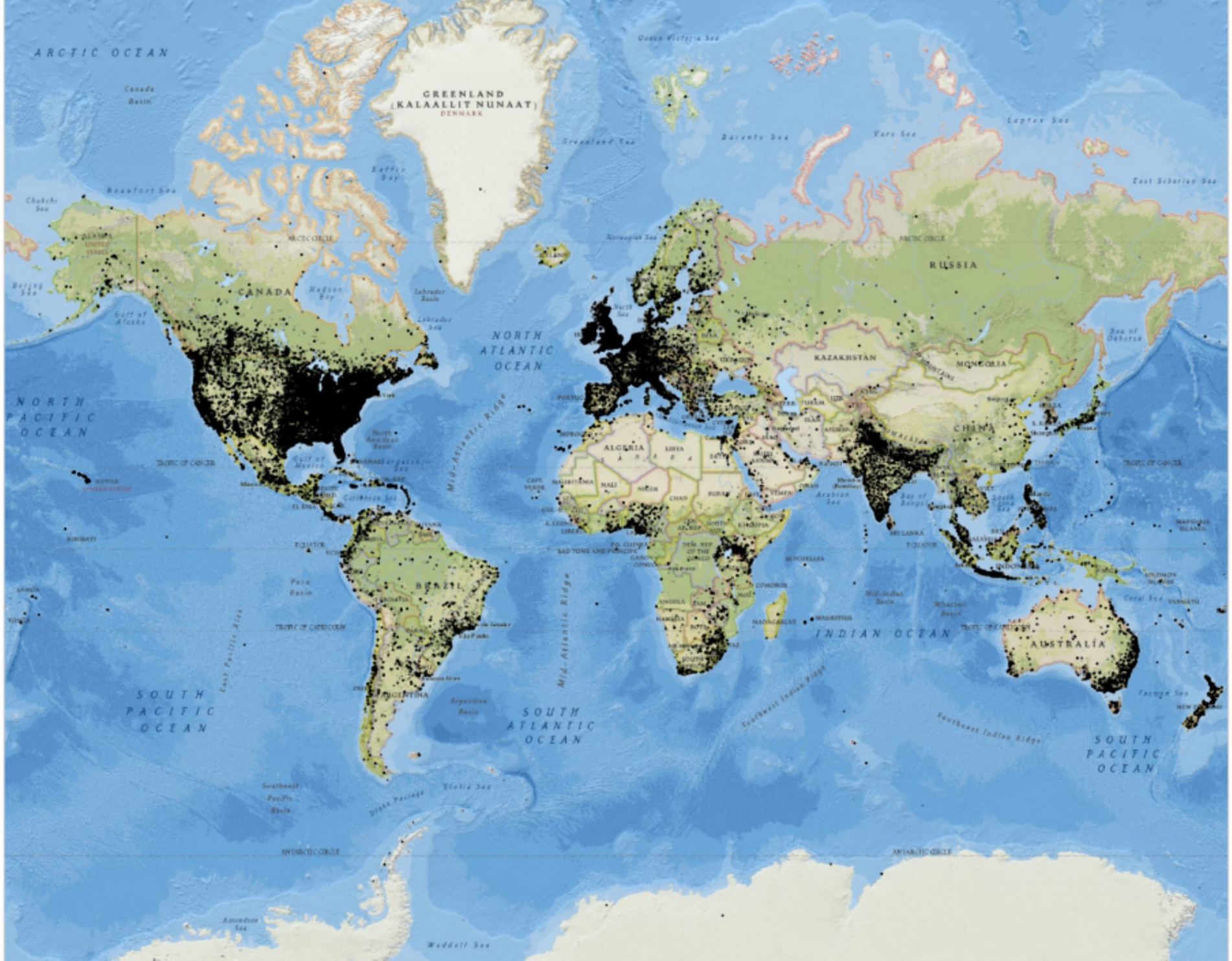
Figure 8. Spatial distribution of the climate change tweet. Each dark dot is a tweet on the world map (after Effrosynidis et al., 2022).
4.2 Climate change believer and non-believer
Where doubters are more common can be determined by interpreting this map. More people deny climate change in Canada, the USA, Cuba, South Africa, Japan, Eastern China, Australia, and Brazil than everywhere else in the globe (Figure 9). On the other hand, the proportion of skeptics to believers is low in Europe, India, and Central Africa (Effrosynidis et al., 2022).
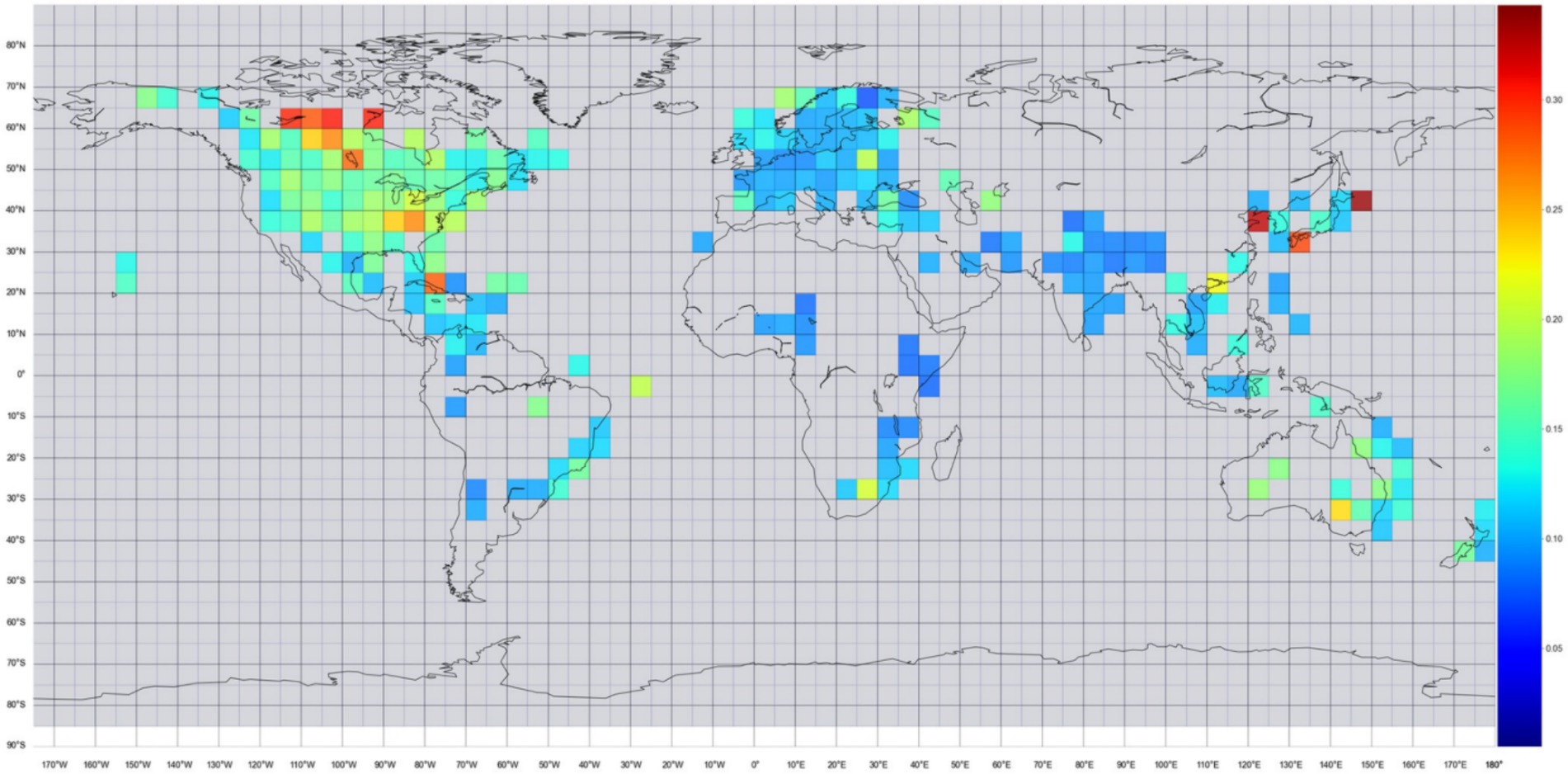
Figure 9. Denier/believer ratio on 5 × 5 arc-minute grid, where there are at least 20 deniers. The ratio ranges between 0 (dark blue) to +0.35 (dark red) adapted from Effrosynidis et al. (2022).
5 Research gaps and future research suggestions
This review highlights the following research gaps:
• Public perceptions and attitudes are becoming more important in influencing climate change policy and action, and people are getting their information from social media. The rapid changes in the social media industry necessitate new research to stay abreast of the various platforms and trends.
• There are many ways social media affects how people think about climate change that need to be examined, such as the spread of false information and the power of media organizations and opinion leaders. Previous studies have concentrated on the role of social media in environmental activism.
• Numerous studies have explored the use of social media for environmental participation and communication. However, most come from just one field, like communication studies or environmental science.
• Prior research often focused on just one social media site, like Twitter or Facebook. However, as social media usage develops, it is critical to examine how newer platforms, like Instagram and TikTok, influence public views and attitudes about climate change.
• Social media sites use algorithms to suggest content to users based on their preferences and actions. The literature briefly discusses how algorithmic curation influences the dissemination of climate change information and its impact on public attitudes.
• A new kind of media ecosystem has emerged due to social media, where traditional media outlets and lone opinion leaders can significantly influence how the public views and feels about climate change. A thorough, systematic review should study how these individuals influenced how the public saw the problem on social media.
• Most studies on social media and climate change have focused on a single country or region, so more comparisons should be made. Comparing the interactions between social media and climate change in various nations and cultural contexts would result in a more in-depth understanding of the problem.
The following summary reports of future research suggestions are given below
• Although the systematic review concluded that social media could influence people’s opinions and attitudes about climate change, further study is required to determine how social media use affects people’s willingness to interact with and take action on the issue.
• The literature focused little on social media’s impact on environmental policy and decision-making. More research is required to fully comprehend social media’s potential influence on environmental policy and decision-making processes.
• The literature has given little attention to social media’s role in boosting mitigation and adaptation measures for climate change. More research is required to fully comprehend the potential of social media to support mitigation and adaptation activities, as well as the effects of these efforts on public involvement and climate change action.
• More research needs to be done to learn more about how other social media platforms like Facebook, Twitter, and Instagram affect public participation and action on climate change.
• Future studies might also examine how different things, such as media literacy and critical thinking abilities, influence how people use social media and connect with and act on climate change.
• Future studies should also look into how social media may encourage increased public involvement and action on environmental concerns, as well as environmental education and awareness.
• Future studies could employ mixed-methods approaches to assess the influence of various social media message types on attitudes and behaviors linked to climate change and examine the efficacy of social media campaigns in promoting climate action and behavior change.
• In the future, case studies and participatory research could be used to look at the challenges and opportunities of using social media to adapt to climate change and build resilience.
• Future research can involve interacting with stakeholders and experts to identify the potential risks and benefits of using social media data, as well as developing guidelines and best practices for data collection, storage, and use to investigate the ethical and privacy implications of gathering and analyzing social media data for climate change research.
• Future studies can use network analysis and social media analytics to map the connections and interactions between climate change actors in different countries and sectors and identify obstacles and opportunities for effective collaboration and coordination.
6 Conclusion
The systematic evaluation of the literature on the connection between climate change and social media has shed light on how social media can influence how the public views and feels about the issue. The review concluded that social media could change how people think about and act on climate change and that different social media platforms may affect people’s thinking and actions. The systematic review did, however, point out some problems, such as selection bias, study heterogeneity, publication bias, the fact that social media is constantly changing, the need for longitudinal studies, and the need for studies on the topic. These findings suggest that future studies should add the research on climate change and social media to make up for the systematic review’s shortcomings. This can be done with mixed methods, longitudinal designs, and a better mix of people from different places and cultures.
Results show a big difference between those who believe in global warming and those who do not. Believers use “global warming” five times less often than “climate change.” Believers tweet more about taking action to prevent climate change, whereas denialists tweet more about global warming and the impacts of extreme weather, using nearly twice as much foul language. Social media influencers and celebrities can do a lot to raise awareness of and take action on climate change, but there have been few studies done on this topic in the past. To assess the role of social media influencers and celebrities in bringing attention to and action on climate change, content analysis, and surveys could be used to find the key messages and themes that resonate with audiences, as well as the factors that contribute to the credibility and effectiveness of climate change communication by influencers. This review ends by pointing out how important it is to keep researching the link between social media and climate change, as well as how social media may be able to change the way people think and feel about an issue and encourage them to get involved and take action on it. Future studies should fix the problems with the systematic review and dig deeper into the links between using social media, public participation, and taking action on climate change.
Data availability statement
The original contributions presented in the study are included in the article/supplementary material, further inquiries can be directed to the corresponding authors.
Author contributions
BS: Conceptualization, Formal Analysis, Writing – original draft. MP: Project administration, Supervision, Writing – review & editing. EA: Funding acquisition, Resources, Writing – review & editing. MS: Formal Analysis, Writing – review & editing. AB: Data curation, Methodology, Writing – review & editing. SP: Software, Visualization, Writing – review & editing. MI: Funding acquisition, Resources, Writing – review & editing. AI: Supervision, Writing – review & editing.
Funding
The author(s) declare that financial support was received for the research, authorship, and/or publication of this article. This work was financially supported by the Deanship of Scientific Research at the King Faisal University, Saudi Arabia (grant: 3,419).
Acknowledgments
We would like to acknowledge the department of Mass communication and Journalism, Begum Rokaya University, Rangpur, Bangladesh. We also acknowledge the reviewers to improve the quality of the manuscript.
Conflict of interest
The authors declare that the research was conducted in the absence of any commercial or financial relationships that could be construed as a potential conflict of interest.
Publisher’s note
All claims expressed in this article are solely those of the authors and do not necessarily represent those of their affiliated organizations, or those of the publisher, the editors and the reviewers. Any product that may be evaluated in this article, or claim that may be made by its manufacturer, is not guaranteed or endorsed by the publisher.
References
Abbate, S., Centobelli, P., and Cerchione, R. (2023). The digital and sustainable transition of the Agri-food sector. Technol. Forecast. Soc. Chang. 187:122222. doi: 10.1016/j.techfore.2022.122222
Al-Rawi, A., OʼKeefe, D., Kane, O., and Bizimana, A. J. (2021). Twitter’s fake news discourses around climate change and global warming. Front. Commun. 6:729818. doi: 10.3389/fcomm.2021.729818
An, X., Ganguly, A. R., Fang, Y., Scyphers, S. B., Hunter, A. M., and Dy, J. G. (2014). “Tracking climate change opinions from twitter data” in Workshop on data science for social good, ed. G. Dy. Jennifer New York City, New York, USA. 1–6.
Basch, C. H., Yalamanchili, B., and Fera, J. (2022). #Climate change on TikTok: a content analysis of videos. J. Community Health. 47, 163–167. doi: 10.1007/s10900-021-01031-x
Baylis, P. (2020). Temperature and temperament: evidence from twitter. J. Public Econ. 184:104161. doi: 10.1016/j.jpubeco.2020.104161
Bednarek, M., Ross, A. S., Boichak, O., Doran, Y. J., Carr, G., Altmann, E. G., et al. (2022). Winning the discursive struggle? The impact of a significant environmental crisis event on dominant climate discourses on twitter. Discourse Context Media 45:100564. doi: 10.1016/j.dcm.2021.100564
Bennett, J., Rachunok, B., Flage, R., and Nateghi, R. (2021). Mapping climate discourse to climate opinion: An approach for augmenting surveys with social media to enhance understandings of climate opinion in the United States. PLoS One 16:e0245319. doi: 10.1371/journal.pone.0245319
Berglez, P., and Al-Saqaf, W. (2021). Extreme weather and climate change: social media results, 2008–2017. Environ. Hazards 20, 382–399. doi: 10.1080/17477891.2020.1829532
Blei, D. M., Ng, A. Y., and Jordan, M. I. (2003). Latent Dirichlet allocation. J. Mach. Learn. Res. 3, 993–1022.
Bloomfield, E. F., and Tillery, D. (2019). The Circulation of Climate Change Denial Online: Rhetorical and Networking Strategies on Facebook. Environmental Communication 13 , 23–34. doi: 10.1080/17524032.2018.1527378
Brossard, D., and Nisbet, M. C. (2007). Deference to scientific authority among a low information public: understanding US opinion on agricultural biotechnology. Int. J. Public Opin. Res. 19, 24–52.
Brunnschweiler, C., and Baland, J. M. (2009). Political polarization, information, and communication: a laboratory experiment. J. Public Econ. 93, 1144–1154.
Camarillo, M. G., Ferguson, E., Ljevar, V., and Spence, A. (2021). Big changes start with small talk: Twitter and climate change in times of Coronavirus pandemic. Front. Psychol. 12:661395.
Cann, T. J., Weaver, I. S., and Williams, H. T. (2021). Ideological biases in social sharing of online information about climate change. PLoS One 16:e0250656. doi: 10.1371/journal.pone.0250656
Carneiro, B., Resce, G., and Sapkota, T. B. (2022). Digital artifacts reveal development and diffusion of climate research. Sci. Rep. 12:14146. doi: 10.1038/s41598-022-17717-8
Cecinati, F., Matthews, T., Natarajan, S., McCullen, N., and Coley, D. (2019). Mining social media to identify heat waves. Int. J. Environ. Res. Public Health 16:762. doi: 10.3390/ijerph16050762
Chang, C. H., Armsworth, P. R., and Masuda, Y. J. (2022). Environmental discourse exhibits consistency and variation across spatial scales on twitter. Bioscience 72, 789–797. doi: 10.1093/biosci/biac051
Chen, T. H. Y., Salloum, A., Gronow, A., Ylä-Anttila, T., and Kivelä, M. (2021). Polarization of climate politics results from partisan sorting: evidence from Finnish Twittersphere. Glob. Environ. Chang. 71:102348. doi: 10.1016/j.gloenvcha.2021.102348
Cook, J., Nuccitelli, D., Green, S. A., Richardson, M., Winkler, B., Painting, R., et al. (2013). Quantifying the consensus on anthropogenic global warming in the scientific literature. Environ. Res. Lett. 8:024024. doi: 10.1088/1748-9326/8/2/024024
Diehl, T., Huber, B., Gil de Zúñiga, H., and Liu, J. (2021). Social media and beliefs about climate change: a cross-national analysis of news use, political ideology, and trust in science. Int. J. Public Opin. Res. 33, 197–213. doi: 10.1093/ijpor/edz040
Duran-Becerra, B., Hillyer, G. C., Cosgrove, A., and Basch, C. H. (2020). Climate change on YouTube: a potential platform for youth learning. Health Promot. Perspect. 10:282. doi: 10.34172/hpp.2020.42
Effrosynidis, D., Sylaios, G., and Arampatzis, A. (2022). Exploring climate change on twitter using seven aspects: stance, sentiment, aggressiveness, temperature, gender, topics, and disasters. PLoS One 17:e0274213. doi: 10.1371/journal.pone.0274213
Eslen-Ziya, H. (2022). Humour and sarcasm: expressions of global warming on Twitter. Humanit Soc Sci Commun 9:240. doi: 10.1057/s41599-022-01236-y
Fage-Butler, A. (2022). A values-based approach to knowledge in the public's representations of climate change on social media. Front. Commun. 7:978670. doi: 10.3389/fcomm.2022.978670
Gaytan, C. M., Ferguson, E., Ljevar, V., and Spence, A. (2021). Big changes start with small talk: twitter and climate change in times of coronavirus pandemic. Front. Psychol.. 12:661395. doi: 10.3389/fpsyg.2021.661395
Gibson, K. E., Sanders, C. E., Lamm, A. J., and Lamm, K. W. (2022). Examining the impact of media use during the COVID-19 pandemic on environmental engagement. Front. Environ. Sci. 10 :789361. doi: 10.3389/fenvs.2022.789361
Goritz, A., Schuster, J., Jörgens, H., and Kolleck, N. (2022). International public administrations on twitter: a comparison of digital authority in global climate policy. J. Comp. Policy Anal. 24, 271–295.
Greenhalgh, T., and Peacock, R. (2005). Effectiveness and efficiency of search methods in systematic reviews of complex evidence: audit of primary sources. BMJ 331, 1064–1065. doi: 10.1136/bmj.38636.593461.68
Hautea, S., Parks, P., Takahashi, B., and Zeng, J. (2021). Showing they care (or don't): affective publics and ambivalent climate activism on TikTok. Social media. Soc. Media Soc. 7:20563051211012344.
Hutto, C., and Gilbert, E. (2014). VADER: a parsimonious rule-based model for sentiment analysis of social media text. Proc. Int. AAAI Conf. Web Soc. Media 8, 216–225. doi: 10.1609/icwsm.v8i1.14550
IPCC . (2018). Intergovernmental panel on climate change. Global warming of 1.5°C. Available at: https://www.ipcc.ch/sr15/ (Accessed January 20, 2024).
Kaushal, A., Acharjee, A., and Mandal, A. (2022). Machine learning based attribution mapping of climate related discussions on social media. Sci. Rep. 12:19033. doi: 10.1038/s41598-022-22034-1
Kirilenko, A. P., and Stepchenkova, S. O. (2014). Public microblogging on climate change: one year of twitter worldwide. Glob. Environ. Chang. 26, 171–182. doi: 10.1016/j.gloenvcha.2014.02.008
Lee, J. H., and Lee, C. F. (2019). Extension of TAM by perceived interactivity to understand usage behaviors on ACG social media sites. Sustain. For. 11:5723. doi: 10.3390/su11205723
Leiserowitz, A., Maibach, E., Roser-Renouf, C., Feinberg, G., and Howe, P. (2013). Climate change in the American mind: Americans' global warming beliefs and attitudes in November 2013. United States: Yale University and George Mason University.
León, B., Negredo, S., and Erviti, M. C. (2022). Social engagement with climate change: principles for effective visual representation on social media. Clim. Pol. 22, 976–992. doi: 10.1080/14693062.2022.2077292
Lewandowsky, S., Cook, J., Fay, N., and Gignac, G. E. (2019). Science by social media: attitudes towards climate change are mediated by perceived social consensus. Mem. Cogn. 47, 1445–1456. doi: 10.3758/s13421-019-00948-y
Li, X., Long, D., Scanlon, B. R., Mann, M. E., Li, X., Tian, F., et al. (2022). Climate change threatens terrestrial water storage over the Tibetan plateau. Nat. Clim. Chang. 12 , 801–807. doi: 10.1038/s41558-022-01443-0
Liao, Q., Huang, J., Zhang, H., Wang, Y., and Chen, X. (2015). The effects of social media on college students. J. Educ. Technol. Dev. Exch. 8, 1–14.
Lindell, J., and Ibrahim, J. (2021). Something “old”, something “new”? The UK space of political attitudes after the Brexit referendum. Sociol. Res. Online 26 , 505–524. doi: 10.1177/1360780420965982
Loureiro, M. L., and Alló, M. (2021). How has the COVID-19 pandemic affected the climate change debate on twitter? Environ. Sci. Pol. 124 , 451–460. doi: 10.1016/j.envsci.2021.07.011
Lu, W., and Hampton, K. N. (2016). Beyond the power of networks: differentiating network structure from social media affordances for perceived social support. New Media Soc. 19, 861–879.
Lu, L., Liu, J., Yuan, Y. C., Burns, K. S., Lu, E., and Li, D. (2021). Source trust and COVID-19 information sharing: the mediating roles of emotions and beliefs about sharing. Health Educ Behav 48, 132–139.
Lutzke, L., Drummond, C., Slovic, P., and Árvai, J. (2019). Priming critical thinking: simple interventions limit the influence of fake news about climate change on Facebook. Glob. Environ. Chang. 58:101964. doi: 10.1016/j.gloenvcha.2019.101964
McCallum, A. K. . (2002). MALLET: a machine learning for language toolkit. Available at: http://mallet.cs.umass.edu (Accessed June 26, 2024).
Moernaut, R., Mast, J., Temmerman, M., and Broersma, M. (2022). Hot weather, hot topic. Polarization and sceptical framing in the climate debate on twitter. Inf. Commun. Soc. 25, 1047–1066. doi: 10.1080/1369118X.2020.1834600
Mumenthaler, C., Renaud, O., Gava, R., and Brosch, T. (2021). The impact of local temperature volatility on attention to climate change: evidence from Spanish tweets. Glob. Environ. Chang. 69:102286. doi: 10.1016/j.gloenvcha.2021.102286
Na’puti, T. R. (2022). Disaster militarism and indigenous responses to super typhoon Yutu in the Mariana Islands. Environ. Commun. 16 , 612–629. doi: 10.1080/17524032.2022.2026798
Page, M. J., McKenzie, J. E., Bossuyt, P. M., Boutron, I., Hoffmann, T. C., Mulrow, C. D., et al. (2021). The PRISMA 2020 statement: an updated guideline for reporting systematic reviews. Int. J. Surg. 88:105906. doi: 10.1016/j.ijsu.2021.105906
Park, C. S., Liu, Q., and Kaye, B. K. (2021). Analysis of ageism, sexism, and ableism in user comments on YouTube videos about climate activist Greta Thunberg. Soc. Media Soc. 7:205630512110360. doi: 10.1177/20563051211036059
Patrick, S. W., Henkhaus, L. E., Zickafoose, J. S., Lovell, K., Halvorson, A., Loch, S., et al. (2020). Well-being of parents and children during the COVID-19 pandemic: a national survey. Pediatrics 146:e2020016824. doi: 10.1542/peds.2020-016824
Pavelle, S., and Wilkinson, C. (2020). Into the digital wild: utilizing twitter, Instagram, YouTube, and Facebook for effective science and environmental communication. Front. Commun. 5 :575122. doi: 10.3389/fcomm.2020.575122
Perez, E., Manca, S., Fernández-Pascual, R., and Guckin, C. M. (2023). A systematic review of social media as a teaching and learning tool in higher education: a theoretical grounding perspective. Educ. Inf. Technol. 28, 11921–11950. doi: 10.1007/s10639-023-11647-2
Pierson, D. J. (2009). How to read a case report (or teaching case of the month). Respir. Care 54, 1372–1378.
Roxburgh, N., Guan, D., Shin, K. J., Rand, W., Managi, S., Lovelace, R., et al. (2019). Characterising climate change discourse on social media during extreme weather events. Glob. Environ. Chang. 54, 50–60. doi: 10.1016/j.gloenvcha.2018.11.004
Samantray, A., and Pin, P. (2019). Credibility of climate change denial in social media. Palgrave Commun. 5, 1–8. doi: 10.1057/s41599-019-0344-4
Shah, Z., Wei, L., and Ghani, U. (2021). The use of social networking sites and pro-environmental behaviors: a mediation and moderation model. Int. J. Environ. Res. Public Health 18:1805. doi: 10.3390/ijerph18041805
Shi, W., Fu, H., Wang, P., Chen, C., and Xiong, J. (2020). #Climatechange vs.#Globalwarming: characterizing two competing climate discourses on twitter with semantic network and temporal analyses. Int. J. Environ. Res. Public Health 17:1062. doi: 10.3390/ijerph17031062
Simpson, S. A., Napawan, N. C., and Snyder, B. (2019). #OurChangingClimate: building networks of community resilience through social media and design. GeoHumanities 5 , 1–17.
Sternudd, H. T. (2020). Climate anxiety on YouTube: young people reflect on how to handle the climate crisis. Ekphrasis 24 , 97–123. doi: 10.24193/ekphrasis.24.6
Su, Y., and Zhang, L. (2014). The effects of social media on college students. J. Educ. Technol. Dev. Exch. 7, 1–14.
Toupin, R., Millerand, F., and Larivière, V. (2022). Who tweets climate change papers? Investigating publics of research through “users” descriptions. PLoS One 17:e0268999. doi: 10.1371/journal.pone.0268999
Treen, K., Williams, H., O'Neill, S., and Coan, T. G. (2022). Discussion of climate change on reddit: polarized discourse or deliberative debate? Environ. Commun. 16, 680–698. doi: 10.1080/17524032.2022.2050776
Uldam, J., and Askanius, T. (2022). Time for climate action?: political “Actors” uses of twitter to focus public attention on the climate crisis during the 2019 Danish general election. Int. J. Commun. 16, 385–408.
Vu, H. T., Blomberg, M., Seo, H., Liu, Y., Shayesteh, F., and Do, H. V. (2021). Social media and environmental activism: framing climate change on Facebook by global NGOs. Sci. Commun. 43 , 91–115. doi: 10.1177/1075547020971644
Vu, H. T., Do, H. V., Seo, H., and Liu, Y. (2020). Who leads the conversation on climate change?: a study of a global network of NGOs on twitter. Environ. Commun. 14, 450–464. doi: 10.1080/17524032.2019.1687099
Walter, S., Lörcher, I., and Brüggemann, M. (2019). Scientific networks on twitter: analyzing scientists’ interactions in the climate change debate. Public Underst. Sci. 28 , 696–712. doi: 10.1177/0963662519844131
Williams, H. T., McMurray, J. R., Kurz, T., and Lambert, F. H. (2015). Network analysis reveals open forums and echo chambers in social media discussions of climate change. Glob. Environ. Chang. 32, 126–138. doi: 10.1016/j.gloenvcha.2015.03.006
Yang, C. L., Huang, C. Y., and Hsiao, Y. H. (2021). Using social media mining and PLS-SEM to examine the causal relationship between public environmental concerns and adaptation strategies. Int. J. Environ. Res. Public Health 18 :5270. doi: 10.3390/ijerph18105270
Yeo, S. K., Handlos, Z., Karambelas, A., Su, L. Y. F., Rose, K. M., Brossard, D., et al. (2017). The influence of temperature on #ClimateChange and #GlobalWarming discourses on twitter. J. Sci. Commun. 16:A01.
Yu, C., Margolin, D. B., Fownes, J. R., Eiseman, D. L., Chatrchyan, A. M., and Allred, S. B. (2021). Tweeting about climate: which politicians speak up and what do they speak up about? Soc. Media Soc. 7:20563051211033815.
Zeng, L. (2022). Chinese public perception of climate change on social media: An investigation based on data mining and text analysis. J. Environ. Public Health 2022:6294436. doi: 10.1155/2022/6294436
Keywords: climate change, global warming, temperature hike, social media, PRISMA, systematic review
Citation: Sultana BC, Prodhan MTR, Alam E, Sohel MS, Bari ABMM, Pal SC, Islam MK and Islam ARMT (2024) A systematic review of the nexus between climate change and social media: present status, trends, and future challenges. Front. Commun. 9:1301400. doi: 10.3389/fcomm.2024.1301400
Edited by:
Tracylee Clarke, California State University, Channel Islands, United StatesReviewed by:
Stefano Abbate, University of Naples Federico II, ItalyClaudel Mombeuil, Independent Researcher, Mirebalais, Haiti
Copyright © 2024 Sultana, Prodhan, Alam, Sohel, Bari, Pal, Islam and Islam. This is an open-access article distributed under the terms of the Creative Commons Attribution License (CC BY). The use, distribution or reproduction in other forums is permitted, provided the original author(s) and the copyright owner(s) are credited and that the original publication in this journal is cited, in accordance with accepted academic practice. No use, distribution or reproduction is permitted which does not comply with these terms.
*Correspondence: Abu Reza Md. Towfiqul Islam, dG93ZmlxX2RtQGJydXIuYWMuYmQ=; Md. Tabiur Rahman Prodhan, dGFiaXVyQGJydXIuYWMuYmQ=
†ORCID: Abu Reza Md. Towfiqul Islam, https://orcid.org/0000-0001-5779-1382
 Bebe Chand Sultana1
Bebe Chand Sultana1 Edris Alam
Edris Alam Md. Salman Sohel
Md. Salman Sohel Subodh Chandra Pal
Subodh Chandra Pal Md. Kamrul Islam
Md. Kamrul Islam Abu Reza Md. Towfiqul Islam
Abu Reza Md. Towfiqul Islam